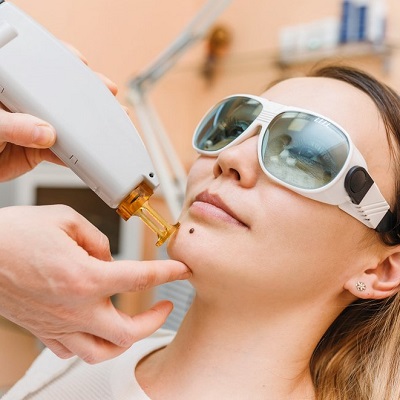
Mole removal treatment in Islamabad can efficiently erase these harmless skin growths that occasionally cause concern. It is your own choice to keep them or remove them. But, many people want to remove these. This is because they do not like its appearance or due to their association with skin cancer. However, a common question that arises is whether moles can regrow after removal. In this blog, we will explore this topic and get a clearer understanding of what to expect after removing a mole.
What Are Moles?
Moles are painless, benign, and have small skin growths. These are caused by pigmented cell clusters that are also called melanocytes. These melanocytes produce the black or brown color of the mole. These can be of different shapes, colors, and sizes. These are mostly harmless. But, some moles can develop into skin cancer. Therefore, it is very important to observe them and notice if there are any changes. They can develop at any age due to different reasons but commonly appear in children and teenagers.
Causes:
The causes of moles are not clear. They sometimes appear out of nowhere. Some known causes are:
- Genetic factors
- Excessive sun exposure
- Fluctuations in hormone
- Age
Mole Removal Treatments:
Commonly used treatments at our clinic are:
Surgical Excision:
It is used to remove large moles or those that are suspected to be cancerous. The treatment area is numbed before it. During this procedure, a surgeon cuts the mole along with the surrounding skin.
Shave Excision:
It is mostly used to remove non-cancerous moles. This is done by shaving off the mole using a scalpel. It leaves the skin flat with minimal scar.
Laser Removal:
In this treatment, a laser beam breaks down the pigment in the mole. It is suitable for smaller and non-cancerous moles.
Cryotherapy:
This involves freezing the mole using liquid nitrogen. It is also suitable for small and non-cancerous moles. It leaves clear or slightly pigmented skin behind.
Electrocautery:
This uses an electrical current to burn the tissues of the mole. It’s usually used for small moles that are not cancerous.
Outcomes of the Treatment:
The outcomes of the treatment vary from person to person. Generally, you should expect the following.
- Prevention from skin cancer
- Getting rid of anxiety and concern
- Enhancement in beauty
- Has minimal scarring
- Provides immediate results
Moles Regrowth: Myth or Reality
Moles can surely regrow after removal. Although this occurrence is relatively uncommon. When doctors remove moles through surgical or laser methods, they typically eliminate the entire mole. It includes the pigment-producing cells. That’s why regrowth is less likely.
In some cases, they may give rise to a new mole over time. Additionally, individuals with a genetic predisposition to developing moles may continue to produce new moles in various areas of their skin throughout their lifetime.
Best Dermatologist for Mole Removal Treatment:
Dr. Maryam Malik is the popular choice of people who want to get mole removal treatment done. She has years of experience and impressive expertise in dermatology. She ensures the patient’s happiness by recommending suitable treatments. The level of trust that her patients show in her capabilities speaks a lot about her credibility. Visit Dynamic Clinic Islamabad to experience the magic yourself.
The Bottom Line!
The answer to the question about mole regrowth is yes. They can regrow but it is very uncommon to happen. Mole removal treatment in Islamabad removes the entire mole, including underlying pigment-producing cells. Therefore, it prevents the reappearance. Additionally, if people have genetic factors associated with it then the moles will keep on reappearing their whole life.
Make sure to observe any changes or irregularities in the moles. Consult a skilled dermatologist at Dynamic Clinic Islamabad if you observe any suspicious changes to rule out skin cancer. Share your goals with the expert and receive personalized treatment.
Book a consultation with us now!


